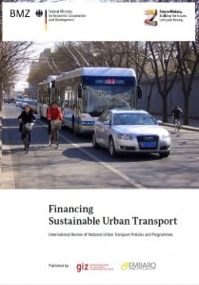A report by the German International Cooperation (GIZ) and EMBARQ, a division of the World Resources Institute (WRI), highlights financing and planning practices used for sustainable urban transport worldwide.
While it is written to inform decision-makers in China, its case studies and findings are relevant for other countries working on sustainable urban transport financing and planning practices.
 27 August 2013: A report by the German International Cooperation (GIZ) and EMBARQ, a division of the World Resources Institute (WRI), highlights financing and planning practices used for sustainable urban transport worldwide. While it is written to inform decision-makers in China, its case studies and findings are relevant for other countries working on sustainable urban transport financing and planning practices.
27 August 2013: A report by the German International Cooperation (GIZ) and EMBARQ, a division of the World Resources Institute (WRI), highlights financing and planning practices used for sustainable urban transport worldwide. While it is written to inform decision-makers in China, its case studies and findings are relevant for other countries working on sustainable urban transport financing and planning practices.
The report reflects feedback from expert participants in the workshop on Prospects for National-Level Programmes and Funds for Sustainable Urban Transport in China, held from 1-3 November 2012. The report first analyzes challenges for urban transport development in China and policies already implemented at the national level to address these challenges. It then summarizes national programmes for financing sustainable urban transport systems in Brazil, Colombia, France, Germany, India, Mexico, the United Kingdom and the United States. It continues to discuss financing models adopted by each country, and two major models of urban transport financing arrangements, Centralised Funding Programmes and Decentralised Financing Policies. Finally, the report comparatively analyzes both models for their international, planning, and financing frameworks.
Sustainable urban transport is highlighted in the report as an important way for countries to achieve their energy savings objectives and reduce their greenhouse gas emissions. The report highlights innovative financing frameworks, including the practice in some German cities to use revenues from municipal energy suppliers to subsidize public transport.
The report concludes with a summary of key scenarios for applications in China, and considers the potential for building effective institutions for sustainable urban transport; securing stable and robust financial flows for sustainable urban transport; facilitating integrated mobility planning; and developing local technical capacity.
GIZ and EMBARQ are members of SLoCaT (the Partnership on Sustainable, Low Carbon Transport), which aims to improve knowledge on sustainable low-carbon transport. SLoCaT is made up of over 80 organizations—including UN organizations, multilateral development banks, and research organizations—and is registered with the Commission on Sustainable Development (CSD). [SLoCaT Press Release][Financing Sustainable Urban Transport Report][Workshop Report on Financing Sustainable Urban Transport]